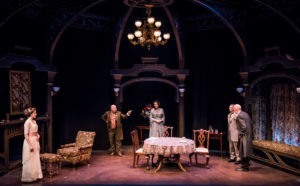In today’s Wall Street Journal drama column I report on an extremely rare revival by the Mint Theater Company of Stanley Houghton’s Hindle Wakes. Here’s an excerpt.
* * *
Of all the countless off-Broadway troupes with which the side streets of Manhattan are dotted, none has a more distinctive mission—or a higher artistic batting average—than the Mint Theater Company, which “finds and produces worthwhile plays from the past that have been lost or forgotten.” If that sounds dull to you, don’t be fooled: I’ve never seen a production there that was a sliver less than superb. Rachel Crothers’ “Susan and God,” John Galsworthy’s “The Skin Game,” Harley Granville-Barker’s “The Madras House,” N.C. Hunter’s “A Day by the Sea,” Dawn Powell’s “Walking Down Broadway,” Jules Romain’s “Doctor Knock,” John Van Druten’s “London Wall”: All these fine plays and others just as good have been exhumed by the Mint to memorable effect in the 13 years that I’ve been reviewing the company, a tribute to the uncanny taste and unfailing resourcefulness of Jonathan Bank, the artistic director.
 This time around, though, Mr. Bank has really pulled one out of his seemingly bottomless hat. I’d never even heard the name of Stanley Houghton, an English playwright who died in 1913 at the age of 32, before the Mint announced its latest revival, a Houghton play called “Hindle Wakes” that hasn’t been staged in the U.S. since 1922. Were it being produced by any other company in New York, I’d probably have passed on so obscure an offering, but the Mint’s infallible record of success led me to roll the dice. It was the right call, too: Not only was Houghton an artist of exceptional skill, but “Hindle Wakes,” his last play, is a study of provincial hypocrisy in Vicwardian England that crackles with a biting candor fully worthy of George Bernard Shaw, on whose far better-known plays it was plainly modeled.
This time around, though, Mr. Bank has really pulled one out of his seemingly bottomless hat. I’d never even heard the name of Stanley Houghton, an English playwright who died in 1913 at the age of 32, before the Mint announced its latest revival, a Houghton play called “Hindle Wakes” that hasn’t been staged in the U.S. since 1922. Were it being produced by any other company in New York, I’d probably have passed on so obscure an offering, but the Mint’s infallible record of success led me to roll the dice. It was the right call, too: Not only was Houghton an artist of exceptional skill, but “Hindle Wakes,” his last play, is a study of provincial hypocrisy in Vicwardian England that crackles with a biting candor fully worthy of George Bernard Shaw, on whose far better-known plays it was plainly modeled.
Fanny Hawthorn (Rebecca Noelle Brinkley), the sparky Lancashire lass at the center of “Hindle Wakes,” lives with her working-class parents (Ken Marks and Sandra Shipley) and toils alongside Christopher, her father, in Hindle’s cotton mill. She’s returned home much later than expected from what the Brits used to call a “dirty weekend” with Alan Jeffcote (Jeremy Beck), a hard-drinking young man about town. No sooner do the Hawthorns confront Fanny, demanding that she tell them where she went and what she did there, than Christopher pays an unscheduled call on Alan’s father Nathaniel (Jonathan Hogan), the owner of the mill and the richest man in town. The objective, naturally, is to force Alan to make an honest woman out of Fanny, but that’s where the plot starts to thicken. Nathaniel, it seems, is a childhood friend of Christopher who clawed his way up the greasy pole of success. What’s more, he’s about to marry off his ne’er-do-well son to Beatrice (Emma Geer), the mayor’s daughter, thereby securing for himself and his wife (Jill Tanner) a place in society that the money of a self-made businessman who “started life in a weaving shed” can’t buy.
What we have here, in short, is a standard-issue clockwork melodrama—except that “Hindle Wakes” proves to be nothing of the kind. The difference is that save for Fanny’s earnest, hapless father, all of the characters respond to her dilemma in unexpected ways, none more so than Nathaniel, a coolly sardonic businessman in the Trollopian mold…
* * *
Read the whole thing here.
